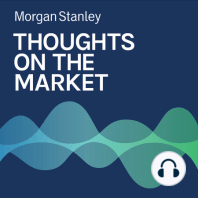3 min listen
Kickstarting the U.S. Mining Industry
ratings:
Length:
9 minutes
Released:
Sep 19, 2023
Format:
Podcast episode
Description
A number of U.S. industries rely heavily on critical minerals that must be imported from other countries. Policymakers and business leaders are calling for investment and reshoring to manage that risk. U.S. Public Policy Research Team member Ariana Salvatore and Head of the Metals and Mining Team in North America Carlos De Alba discuss.----- Transcript -----Ariana Salvatore: Welcome to Thoughts on the Market. I'm Ariana Salvatore from our U.S. Public Policy Research Team. Carlos De Alba: And I am Carlos De Alba, Head of the Metals and Mining Team in North America. Ariana Salvatore: On this special episode of the podcast, we'll discuss what we see as an inflection point for the U.S. metals and mining industry. It's Tuesday, September 19th, at 10 a.m. in New York. Ariana Salvatore: Since 1990, the U.S. has seen a significant increase in both the variety of imported minerals and the level of dependance on these imports. As of right now, U.S. reliance on imported critical minerals has reached a 30 year high, and simultaneously, investment in the industry is near its lowest point in decades. But as we're seeing the world transition to a multipolar model where supply chains are more regional than global, it's becoming ever more obvious that the U.S. needs to turn to reshoring in order to satisfy its growing need for these critical minerals. So, Carlos, before we get too deep in the weeds, let's start off with something simple. Can you define critical minerals for our audience? Carlos De Alba: Yeah. So the Energy Act of 2020 defined critical minerals as those which are essential to the economy and the national security of the United States. They also have a supply chain that is vulnerable to disruption and serve an essential function in the manufacturing of a product, the absence of which would have significant consequences for the economic and national security of the country. The Act also specified that critical minerals do not include fuel minerals, water, ice or snow, or common varieties of sand, gravel, stone and clay. The U.S. Geological Survey, or USGS, is a government agency in charge of creating the official list of critical minerals that are meet that criteria that I just mentioned. Ariana Salvatore: So given the importance of these critical minerals, what are some of the factors that led to this prolonged underinvestment in the metals and mining industry? And who have been the major exporters of critical minerals to the U.S. over the last three decades? Carlos De Alba: It is quite a complex issue, but the bottom line is that the US has scaled back its mineral extraction, processing and refining capabilities since the 1950s, because of environmental concerns and economic considerations like higher labor costs and lower economies of scale. As mining activities decline in the U.S., the country has increasingly relied on imports from China, Brazil, Mexico, South Africa, Indonesia, Canada and Australia, among others. Ariana Salvatore: So it's obvious that China is clearly in a powerful position to influence the global mineral markets. It's the first one on the list that you just mentioned. What is China to doing right now with respect to its exports of minerals and what is your outlook when you're thinking about the future? Carlos De Alba: Well, over the last 4 to 5 decades, China gradually took over the industry by heavily investing in exploration, mineral extraction, and more importantly, refining and processing capabilities. China's dominance over the world minerals processing supply chains has created, as you would expect, geopolitical and economic uncertainties can cause supply disruptions to crucial end markets such as green technologies and national security. A recent example of export curbs took place in July of this year, when China imposed export restrictions on two chipmaking minerals, gallium and uranium, citing national security concerns. The move was widely interpreted as a retaliation against the US and its allie
Released:
Sep 19, 2023
Format:
Podcast episode
Titles in the series (100)
Mike Wilson: 3 Summer Surprises Investors Could Be Missing by Thoughts on the Market
